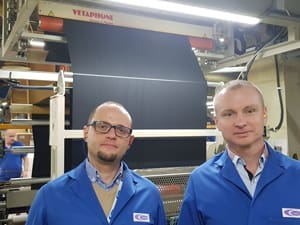Europe’s leading manufacturer and distributor of household disposable products, CeDo, has confirmed its commitment to quality with a significant investment in Corona treatment technology from the market-leading Danish company, Vetaphone. Renowned for its range of refuse sacks and bio bags, food, freezer and sandwich bags as well as aluminium foils and cling films, CeDo now has a presence in most of continental Europe, as well as the UK.
The company, which primarily focusses on private label products, supplies to most of the leading retail chain stores in Europe, and also produces goods under its own brands of Paclan and Poly-Lina. Today, the company has production facilities in four countries from its headquarters in Telford (UK) to a PE production plant in Hanoi (Vietnam). The main European production facility is located in Katy Wroclawskie, southern Poland, which employs more than 550 people and enjoys an annual turnover of around €150m. This is made up of 80,000 tonnes of PE bags, aluminium foil and cling film.
In addition to production, the Wroclaw site handles sales and service for Poland and Eastern Europe. The Paris office handles France, Spain, Portugal and Italy, while the Monchengladbach office looks after Germany, Austria, Benelux, and Scandinavia. The growing Russian market is handled out of Moscow. There is also a PE re-cycling plant in The Netherlands. The origins of the multi-faceted group began with Poly-Lina in the UK, and through various acquisitions and mergers CeDo now belongs to Straco, a Belgian family-run concern, which since 2014 has committed to a programme of continual investment to lift the business past its present €320m position.
It was when the new plant opened in Poland in 2001 that CeDo began to look at surface treatment technology as a way of improving product quality. After detailed market studies and trials, Vetaphone was selected as the key provider, and between 2001 and 2015, a total of 10 of the Danish manufacturer’s units were installed, with a further nine being added between 2015 and 2017. These included four systems type VE1B-A (PF2-10)1520 QC station and 1.5 kW generator, three systems type VE1B-A (DS)620 QC, with a specially design station with 1 kW generator, and two systems type VE1B-A (DS)1120 QC station and 1,5 kW generator
Today, more than 25% of CeDo’s total output has received Vetaphone surface treatment. Speaking for the company, Site Director at Katy Wroclawskie, Andrzej Majewski stated: “We operate 78 lines here on a 24/7 basis, so reliable technology is essential. Our experience with Vetaphone equipment has been outstanding. It is easy to use, robust, and excellent value for money. It also takes away one of the production variables.”
One of the advantages of standardising on a single supplier for surface treatment is the consistency it provides, both in performance and the working partnership that builds between the two companies. “Many suppliers offer only standard products, but with Vetaphone we have been able to refine specification to suit our exact requirements. We also appreciate the after sales support and programme of continuous improvement from which we have benefitted over the years with various upgrades,” added Mariusz Ruciński, Project Manager responsible for the investment plan at Katy Wroclawskie. With a web width range from 300mm to 1,500mm, CeDo’s requirements play to Vetaphone’s strength of offering custom solutions.
Speaking for Technograph, Vetaphone’s distributor in Poland, Product Manager Magdalena Zaczkiewicz commented: “Working closely with such a major name as CeDo is a huge bonus for Vetaphone because it validates our claim to offer market leading technology and service that is bespoke to each customer. Surface treatment is only part of the overall process, but it is a crucial one, if consistent quality is required.” To ensure this happens, the two companies hold regular technical meetings, providing a two-way information exchange that keeps both up to speed.
Next on the agenda at Katy Wroclawskie is a major expansion project that will see a further 7,000sqm of floorspace added to the site. Destined to raise annual production initially by 20,000 tonnes but eventually 35,000 tonnes, the larger facility will employ an additional 100 people, making CeDo the biggest local employer. “We see potential for more Vetaphone Corona units in 2019 to equip the additional manufacturing capability – we value their knowledge, and appreciate the consistent accuracy of their equipment’s performance,” concluded Majewski, who has brought his previous experience from the automotive industry to bear at CeDo.

